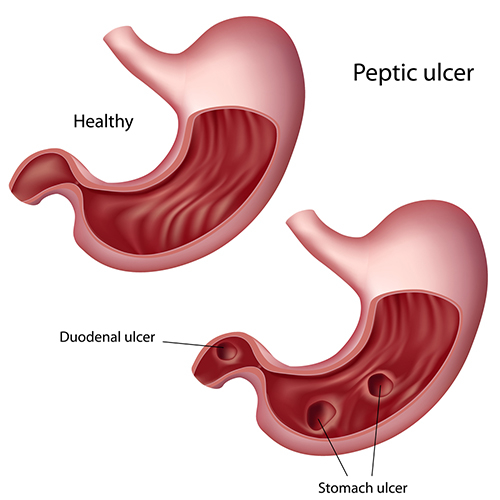Duodenal ulcer
Key facts
- A duodenal ulcer is a sore in the lining of part of your small intestine.
- You may experience stomach pain, bloating or feeling sick with a duodenal ulcer.
- Eating food might help, but some foods can make it worse.
- A duodenal ulcer can be caused by helicobacter pylori bacteria or certain medicines that harm the protective lining of your small intestine.
What is a duodenal ulcer?
A duodenal ulcer is a sore that forms in the lining of the duodenum. Your duodenum is the first part of your small intestine, just beyond the stomach. These ulcers often cause pain in the upper tummy, just below the breastbone.
You can also get an ulcer in your stomach. Stomach ulcers and duodenal ulcers are both types of peptic ulcers. If you have either of these, you have what's called 'peptic ulcer disease'. Once treated, they usually get better within a few weeks.

What are the symptoms of a duodenal ulcer?
If you have a duodenal ulcer, you might:
- have pain in your abdomen (stomach or tummy area)
- feel full and bloated after eating
- feel like you might vomit
- lose weight
Your stomach pain may come and go. It can often be relieved by eating or taking an antacid medicine. Sometimes food makes the pain worse.
Occasionally, an ulcer can cause serious complications. Go to the emergency department if:
- you have a sharp pain in your stomach that doesn't go away
- your vomit or stools (poo) look bloody or a black colour
If you have a sharp pain in your abdomen that doesn't go away, or if you have blood in your vomit or stools, call triple zero (000) and ask for an ambulance.
If you are concerned about symptoms, you can use healthdirect's online Symptom Checker. This can give you advice on what to do next and when to seek medical attention.
CHECK YOUR SYMPTOMS — Use the Symptom Checker and find out if you need to seek medical help.
What causes duodenal ulcers?
A duodenal ulcer is usually caused by a bacteria called helicobacter pylori, or H. pylori. The bacteria can inflame the protective lining of your duodenum, causing more stomach acid to be produced. If the protective lining is damaged, an ulcer can form.
Some medicines can also cause duodenal ulcers, particularly anti-inflammatory medicines such as ibuprofen and aspirin. They can sometimes harm the protective lining, allowing acid to create an ulcer.
There are some lifestyle factors that may make you more likely to get a duodenal ulcer, such as:
- smoking
- drinking a lot of alcohol
- experiencing stress
However, these factors are usually not the main cause of duodenal ulcers.
When should I see my doctor?
See your doctor if you experience abdominal pain, feeling very full after eating, nausea or unexplained weight loss.
FIND A HEALTH SERVICE — The Service Finder can help you find doctors, pharmacies, hospitals and other health services.
How are duodenal ulcers diagnosed?
To diagnose a duodenal ulcer, your doctor will talk to you and examine you. They will probably also run some tests to find out if you have H. pylori in your body. These tests may include:
- a blood test
- a stool (poo) sample
- a breath test
Your doctor may also arrange for you to have a gastroscopy. This is also called an endoscopy.
A specialist doctor uses a thin, flexible tube with a camera on the end to look inside your stomach and duodenum. If you have a gastroscopy, your surgeon might take a sample of tissue, called a biopsy, to test for H. pylori.
How are duodenal ulcers treated?
If your ulcer is caused by H. pylori, the usual treatment is 'triple therapy'. This means taking 2 antibiotics and a proton pump inhibitor (PPI) medicine. The antibiotics kill the bacteria, while the PPI medicine reduces the acid made by your stomach.
If you don't have an H. pylori infection and you have been using anti-inflammatory medicines, you might be advised to stop taking them if possible. You will also need to start taking a PPI medicine to reduce the acid production in your stomach.
You can make some other changes to improve your symptoms, such as:
- drinking less alcohol
- losing weight if you are living with obesity
- quitting smoking
- eating smaller meals
- having your evening meals a few hours before bedtime
- avoiding triggering foods such as coffee, fatty foods, spicy foods and acidic foods such as tomato
Can duodenal ulcers be prevented?
H. pylori infection — the most common cause of duodenal ulcers — is often present in childhood, but adults can also be infected. Practicing good hygiene can help prevent infection.
Complications of duodenal ulcers
If left untreated, your duodenal ulcer may get worse. This can cause other complications, such as:
- a bleeding ulcer — this can vary from a small trickle to a serious, life-threatening bleed
- a perforation — this is when the ulcer goes through the wall of the duodenum, causing food and acid to leak into your belly
These complications require emergency treatment and can cause sharp pain, bloody vomit or bloody stools (poo).
Resources and support
Visit the Gastroenterological Society of Australia for information about helicobacter pylori.
The Gut Foundation also has information on gastrointestinal and digestive health.
You can also call the healthdirect helpline on 1800 022 222 (known as NURSE-ON-CALL in Victoria). A registered nurse is available 24 hours a day, 7 days a week.
Learn more here about the development and quality assurance of healthdirect content.
Last reviewed: May 2024











